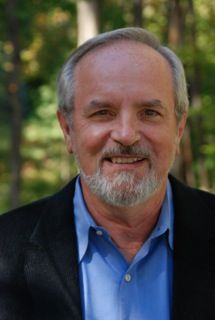
Religion
Simple Acts of Spiritual Depth: Creating Your Own Religion
Part two of my Interview with psychotherapist and former monk Thomas Moore
Posted January 15, 2014

Author Thomas Moore
Nature, monastic vows, building a spiritual library, honoring the dead, the Zen concept of emptiness, and the loss of his friend and colleague, post-Jungian thinker James Hillman, are among the rich sampling of topics from part two of my interview with Thomas Moore, author of A Religion of One’s Own: A Guide to Creating Personal Spirituality in a Secular World. A former monk, psychotherapist, musician and scholar of religion, Moore explains that while he encourages individuals to develop their own personal spirituality outside the boundaries of organized traditions, he is not against religion. Rather, he advocates the revolutionary path of finding a “different way of dealing" with religion by studying and learning from the world’s various traditions—then composing those tenets into a faith of one’s own.
Pythia: In our last interview, you spoke of sitting beside a river and meditating as a form of personal spirituality. Can you say more about how and why nature can lead to a deeper connection to the mystical dimension within ordinary reality?
Thomas Moore: Part of the function of religion is to get us beyond ourselves, and our egos—so we all need various forms of transcendence. That’s the whole thrust of Buddhism; Christianity is all about transcending a narcissistic way of life through love of one’s neighbor; and the Sufi poets suggest finding divinity wherever you turn. And so because it’s vast, mysterious and out of our control, Nature can become an “avatar” of our personal religion. By “avatar” I mean a representative, or a doorway through which we can enter into a relationship with the mysterious.

Take the Solstice, for example. A person might decide on that day to pay close attention to the coming of the end of darkness, and the arrival of light and the change in the season. Similarly if you watch what’s going on in the sky on a daily basis, and pay attention to the weather, it connects you to this larger, transpersonal world. In fact, I don’t know if there’s a better way of gaining a ritual sense of life and the mysteries around us than nature.
Pythia: In your chapter “Muses and Angels” you write about the influence of guides, visible and invisible, on your own destiny, and also as an important part of one’s own path. In it you quote James Hillman, a leading post-Jungian thinker who died two years ago, on how our ancestors can inspire us and how their “voices speak to us and give us direction…” The two of you shared a remarkable friendship, and I’m sure a lot of readers will want to know how it’s been for you losing such a close colleague—and if you still feel his presence and influence.
Thomas Moore: It’s a funny thing, but it’s true that whenever people die they don’t go away. The relationship changes, but it doesn’t end. And my relationship with Hillman personally and with his work is still very intense. Just this past New Year’s Eve, I toasted him because I felt that his spirit was somehow present. There’s something eternal about love, friendship and colleagueship, and we shared all those things.
At the same time, I can’t believe that he’s not here. I’ve had a lot of people die in my life, but I never imagined life without him, because he was always there, supporting me, arguing with me and having fun. So I miss all that tremendously. But as I learned from him and as I learned from my own studies, religion begins with a relationship with the dead.
Pythia: Can you say more about how religion begins with a relationship with the dead?
Thomas Moore: Scholars on religion often say that historically, religion arose when people began to honor the dead. From that came questions about the afterlife and the meaning of life, as well as how to honor the dead, or how to bury or cremate those who have died.
Because I take from every source I can, I learned that for me to be religious in my own way, I needed a personal relationship with those who’ve passed on ahead of me. In Hillman’s last book,The Lament of the Dead, he even spoke of honoring those who’ve influenced us through their thoughts and writings. So as a way to keep Hillman present and as a ritual way to honor his work, I made a resolution to present one of his ideas whenever I give a public talk. That’s a religious act for me; even footnotes are sacred as a way of honoring someone’s ideas from the past.
Pythia: In developing a personal spiritual practice, you also draw from the great wealth of the monastic traditions.
Thomas Moore

Thomas Moore
Pythia: What are some of the books in your own personal library?
Thomas Moore: Among the books that are essential in my own library are Emerson's Essays; Jung's Collected Works and Memories, Dreams, Reflections; Teilhard de Chardin’s The Divine Milieu; Emily Dickinson’s Letters; Edgar Wind’s Pagan Mysteries in the Renaissance; several translations of the Tao Te Ching; Samuel Beckett’s Waiting for Godot; Shunryu Suzuki’s Zen Mind, Beginner's Mind; James Hillman’s Re-Visioning Psychology; The Gospels in Greek; and Oscar Wilde’s De Profundis; among many other works.
Pythia: You also write about the importance of dedication and the act of taking monastic vows.
Thomas Moore: The vow of poverty was one of the most valuable lessons I learned from monastic life. This didn’t mean not to have things; it meant to share things. This practice helped cultivate a sense of common ownership. This is especially important as an attitude toward public spaces like our highways, buildings, parks and streets, rather than thinking they’re the responsibility of government officials or businesses.
Other things I learned from monastic life include keeping a daily schedule, as well as surrounding ourselves with art and images that inspire us, and that remind us of our personal religious values. I also make the point that each religious tradition has something particular to offer that we can borrow from for our own religion.
Pythia: Can you give me an example of a concept a person could “borrow” for their practice?
Thomas Moore: We might want to study Zen Buddhism in order to discover how important it is not to get caught in literalizing our religion or in taking it too seriously, as well as the emptiness underlying all existence.
This same idea of emptiness can be found in other sources: All of the writer Samuel Beckett's work can be summed up as "nothing to be done." There is the Chinese concept of Wu Wei, or achieving much by doing nothing. The musician John Cage said, "I have nothing to say and I'm saying it and that is poetry." For myself, I know that deep down all that I've written is inadequate—at its very core, it’s nothing. But I keep writing with the hope that that base of nothingness will give my work the honesty it requires.



